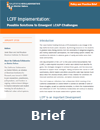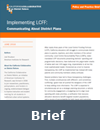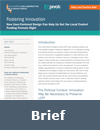Meeting 29
November 12-13, 2015
Sacramento, California
The California Collaborative on District Reform convened in Sacramento for a two-day meeting, Fulfilling the Promise of LCFF: Improving the LCAP. At the request of State Board of Education (SBE) President Mike Kirst, the Collaborative examined the current state of the Local Control Accountability Plans (LCAP) and worked towards recommendations for improvement. The meeting highlighted challenges that districts and others have encountered in the LCAP development and approval process and identified some potential solutions to those challenges. It also examined ways in which districts might more effectively communicate about the LCAP with community members. To close the meeting, participants discussed ways that the SBE can facilitate more clarity and consistency in the messaging and supports that districts receive from the county offices of education. Participants received a briefing book of resources and literature that included analyses of early LCAP efforts, approaches to strategic planning, background on LCFF and the ongoing evolution of the LCAP, and example materials that districts have developed to communicate to their communities.
Meeting Summary (PDF 547 KB)
Briefing Book
- Cover Letter (PDF 295 KB)
- Agenda
- LCAP Early Implementation
- Strategic Planning and the LCAP Process
- LCFF Resources
- Example Communications Materials
Follow-Up
Policy and practice briefs produced as an outcome from Meeting 29.
Implementing LCFF: Possible Solutions to Emergent LCAP Challenges (PDF, 186 KB)
January 2016
The Local Control Accountability Plan (LCAP), a state-required document in which districts describe their goals, their strategies to achieve these goals, and the resources allocated to support these strategies, is a central component of California’s Local Control Funding Formula (LCFF). Having completed two rounds LCAP submissions, district leaders and others around the state have learned much about what the process entails, where it has created the conditions for improved practices and outcomes, and where obstacles remain. This brief, the third in a series from the California Collaborative exploring key issues of LCFF implementation, outlines the key challenges undercutting the LCAP’s effectiveness and offers short term and long term solutions to these identified challenges. For more information about LCFF, please view the resources on the LCFF page of the California Collaborative website. .
Implementing LCFF: Communicating About District Plans (PDF, 4,551 KB)
July 2016
As they continue to implement the Local Control Funding Formula (LCFF), California educators find themselves struggling to communicate district plans to parents, teachers, and other members of the school community. To help inform the community about districts’ plans and results, many districts voluntarily produced supplementary materials to accompany their 2015 Local Control Accountability Plan (LCAP). Following suit, the State Board of Education is considering “executive summaries” as one solution to effectively inform the public. But what does a good executive summary or other outreach approach look like? This brief, the fourth in a series from the California Collaborative exploring key issues of LCFF implementation, identifies some guidelines for district leaders to make their plans more accessible.
Fostering Innovation: How User-Centered Design Can Help Us Get the Local Control Funding Formula Right (PDF, 697 KB)
July 2017
The Local Control Funding Formula (LCFF) has introduced positive and much-needed change to California’s approach to K-12 education funding by allocating resources according to student need and freeing districts to make decisions that address local priorities. For all of LCFF’s advantages, however, the Local Control Accountability Plans (LCAPs) in which districts articulate their programmatic and spending decisions have received criticism for being archaic, cumbersome, difficult to complete, opaque, and incoherent. This brief, written in partnership with Pivot Learning, is the fifth in a series from the California Collaborative exploring key issues of LCFF implementation, and it describes an alternative approach to solving policy problems. The brief shares four prototypes that emerged from a November 2016 design sprint as new approaches to achieving LCFF goals. By embracing user-centered design, California’s education leaders have an opportunity to overcome flaws in the LCAP, fulfill the potential of LCFF, and preserve the funding system through the upcoming statewide elections and into the future.



